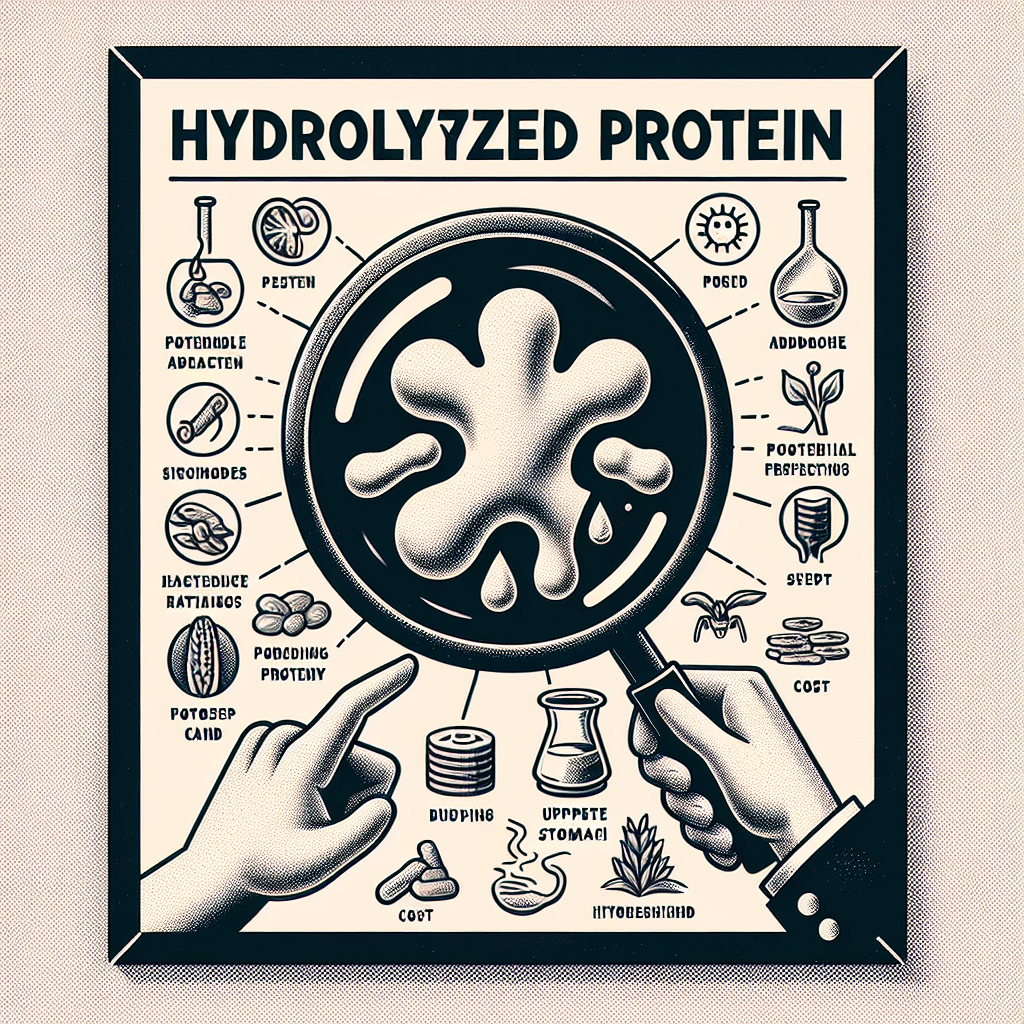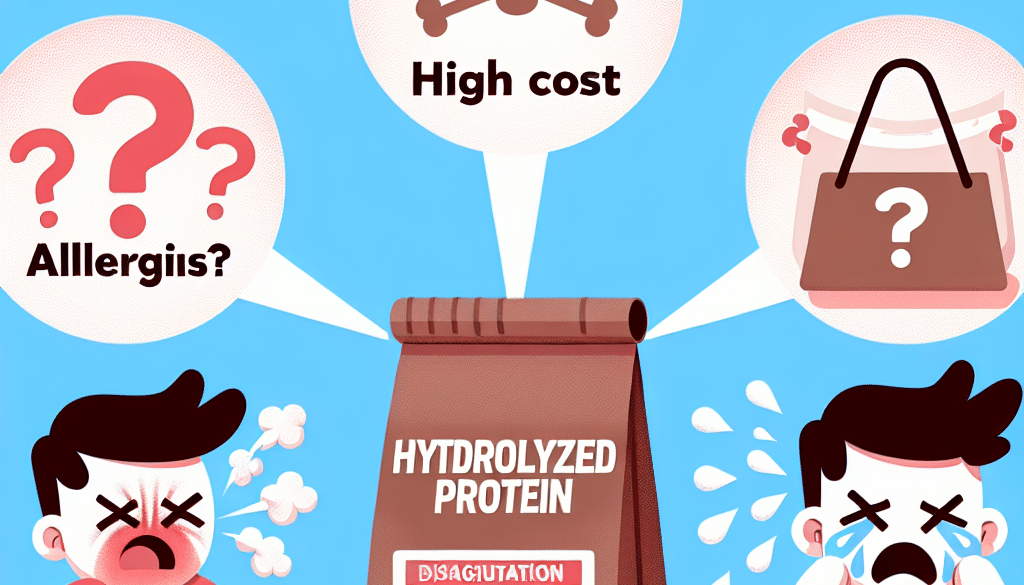What Are The Disadvantages Of Hydrolyzed Protein?
-
Table of Contents
- Hydrolyzed Protein: Understanding Its Disadvantages
- What is Hydrolyzed Protein?
- Potential Allergenicity
- Artificial Additives and Contaminants
- Cost and Accessibility
- Impact on Taste and Palatability
- Limited Research on Long-Term Effects
- Conclusion: Weighing the Pros and Cons
- Discover ETprotein’s High-Quality Protein Products
Hydrolyzed Protein: Understanding Its Disadvantages

Hydrolyzed protein has become a popular ingredient in various dietary supplements, sports nutrition products, and medical foods. It is often touted for its rapid absorption and ease of digestion, which can be particularly beneficial for athletes, individuals with digestive issues, and patients requiring nutritional support. However, despite its advantages, hydrolyzed protein is not without its drawbacks. This article explores the disadvantages of hydrolyzed protein, providing a comprehensive understanding of its potential downsides.
What is Hydrolyzed Protein?
Before delving into the disadvantages, it’s important to understand what hydrolyzed protein is. Hydrolyzed protein is produced by breaking down the protein molecules into smaller peptides or individual amino acids through a process called hydrolysis. This can be achieved through various methods, including enzymatic hydrolysis or acid hydrolysis. The resulting product is a form of protein that is more easily absorbed by the body.
Potential Allergenicity
One of the primary concerns with hydrolyzed protein is its potential to cause allergic reactions. Despite the hydrolysis process, which is intended to reduce allergenicity, some individuals may still experience adverse reactions to hydrolyzed proteins, particularly if they have a pre-existing allergy to the source protein.
- Case Studies: There have been instances where hydrolyzed whey or casein proteins have triggered allergic responses in individuals with milk allergies.
- Statistics: Research indicates that while hydrolysis can reduce allergenicity, it does not completely eliminate the risk for all individuals.
Artificial Additives and Contaminants
Another disadvantage of hydrolyzed protein is the potential inclusion of artificial additives and contaminants. The hydrolysis process often requires the use of chemicals or enzymes, which can introduce unwanted substances into the final product.
- Examples: Some hydrolyzed proteins may contain traces of monosodium glutamate (MSG) or other flavor enhancers added to mask the bitter taste resulting from hydrolysis.
- Health Implications: These additives can cause adverse effects in sensitive individuals, including headaches, nausea, and other symptoms associated with MSG sensitivity.
Cost and Accessibility
The production of hydrolyzed protein is typically more expensive than that of non-hydrolyzed protein due to the additional processing required. This cost is often passed on to the consumer, making hydrolyzed protein products less accessible to those on a tight budget.
- Price Comparison: Hydrolyzed protein supplements can be significantly more expensive than their non-hydrolyzed counterparts.
- Accessibility: The higher cost may limit the availability of these products to a wider audience, particularly in developing countries or for individuals with limited financial resources.
Impact on Taste and Palatability
The process of hydrolysis can alter the taste and texture of protein, often resulting in a bitter flavor that can be off-putting to some consumers. This can impact the palatability of hydrolyzed protein products and may require the addition of flavorings or sweeteners to make them more acceptable.
- Consumer Preferences: The altered taste profile may lead some individuals to prefer non-hydrolyzed protein sources.
- Additional Ingredients: To improve taste, manufacturers may add sugars or artificial sweeteners, which can be a concern for those monitoring their sugar intake or seeking natural products.
Limited Research on Long-Term Effects
While hydrolyzed protein is generally considered safe, there is limited research on the long-term effects of consuming hydrolyzed protein in large quantities or over extended periods. This lack of data can be a concern for individuals who rely heavily on these products for their protein intake.
- Research Gaps: More studies are needed to fully understand the potential health implications of long-term hydrolyzed protein consumption.
- Precautionary Principle: Until more is known, some health professionals recommend moderation in the use of hydrolyzed protein supplements.
Conclusion: Weighing the Pros and Cons
In conclusion, while hydrolyzed protein offers benefits such as enhanced absorption and digestibility, it is important to consider its disadvantages. These include potential allergenicity, the presence of artificial additives, higher costs, impacts on taste, and the need for more research on long-term effects. Consumers should weigh these factors when deciding whether hydrolyzed protein products are suitable for their dietary needs and preferences.
Discover ETprotein’s High-Quality Protein Products
If you’re looking for protein products that balance quality with health-conscious considerations, ETprotein offers a range of options that may suit your needs. Their products are characterized by a neutral taste, non-GMO, and allergen-free attributes, ensuring that you can enjoy the benefits of protein without the common disadvantages associated with hydrolyzed proteins.
ETprotein’s offerings include a variety of organic and vegan protein sources, such as rice protein, pea protein, and seed-based proteins, which are ideal for those seeking natural and sustainable options. With a commitment to purity and quality, ETprotein caters to a diverse range of industries and consumer preferences.
For more information on ETprotein’s products and how they can meet your protein requirements, please contact them at sales(at)ETprotein.com.
About ETprotein:
ETprotein, a reputable protein and L-(+)-Ergothioneine (EGT) Chinese factory manufacturer and supplier, is renowned for producing, stocking, exporting, and delivering the highest quality organic bulk vegan proteins and L-(+)-Ergothioneine. They include Organic rice protein, clear rice protein, pea protein, clear pea protein, watermelon seed protein, pumpkin seed protein, sunflower seed protein, mung bean protein, peanut protein, and L-(+)-Ergothioneine EGT Pharmaceutical grade, L-(+)-Ergothioneine EGT food grade, L-(+)-Ergothioneine EGT cosmetic grade, L-(+)-Ergothioneine EGT reference grade and L-(+)-Ergothioneine EGT standard. Their offerings, characterized by a neutral taste, non-GMO, allergen-free attributes, with L-(+)-Ergothioneine purity over 98%, 99%, cater to a diverse range of industries. They serve nutraceutical, pharmaceutical, cosmeceutical, veterinary, as well as food and beverage finished product distributors, traders, and manufacturers across Europe, USA, Canada, Australia, Thailand, Japan, Korea, Brazil, and Chile, among others.
ETprotein specialization includes exporting and delivering tailor-made protein powder and finished nutritional supplements. Their extensive product range covers sectors like Food and Beverage, Sports Nutrition, Weight Management, Dietary Supplements, Health and Wellness Products, and Infant Formula, ensuring comprehensive solutions to meet all your protein needs.
As a trusted company by leading global food and beverage brands and Fortune 500 companies, ETprotein reinforces China’s reputation in the global arena. For more information or to sample their products, please contact them and email sales(at)ETprotein.com today.














